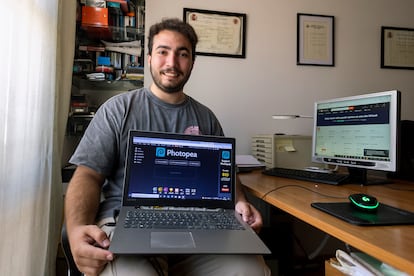‘Earn $1,600 a month by playing video games’: The business of purchasing and flipping accounts
Javier Collado has entered the business of buying and selling profiles using his reputation as a player and intermediary

At any given time of day, close to three million people are simultaneously playing Fortnite. According to its developer, Epic Games, the video game boasted a total of 350 million registered accounts in 2020.
Users can level up by opening chests, obtaining “skins,” weapons or powers, achieving crowns or eliminating other players. Frequent players gain experience points, and they can also score wins by purchasing elements offered in the game itself.
The video game world generates about €150 billion of revenue a year, according to the American consultancy firm Newzoo. The figure exceeds that of the film and music industries together, and it continues to grow. The business is not only profitable for large developers: external markets hawk costumes, bows, knives, screws, powers, virtues, keys and trunks–and accounts.
Javier Collado, 26, has entered the business in which everything is virtual, except money (though some operations do use cryptocurrency). He has been playing video games all his life. His friends are players from other parts of the world who he has never met in person. One of them told him that there he could make his pastime profitable: create accounts, play and rise through the levels, then sell them to other players. He was attracted by the idea of making a profit. He has now sold more than a thousand accounts. He does not think of it as a business, since he dedicates the profits to paying for his schooling in aviation and completing the flight hours he needs to be a commercial pilot. But thanks to his hobby, he now earns a salary that ranges “between €1,200 [1,230] and €1,500 [1,580] a month,” he says.
It started with one account. He played the game “from morning to night” for a week, and he had it ready for sale. He repeated the maneuver about 20 more times. The account that brought him the most money made €300 ($316). In his best months, after Christmas, which is one of the times when his services are most popular, he made €3,000 (3,160). (The platforms that facilitate the purchase and sale keep between 15% and 20% of the revenue.) Collado has a tax advisor, makes his filings and pays taxes.
After his first foray into the business, he saw that it took up a lot of time. He had gained a reputation among players, and he became primarily a middleman: he buys accounts in bulk and then resells them, using his reputation and the valuation of his previous buyers. That reputation allows him to acquire accounts for one to three euros and to sell them for about €20 ($21) after checking them and, in some cases, playing to increase the level. “I try to make sure that nothing can cause problems for people who buy. I take on my share of responsibility and I want the experience to be fruitful for everyone,” he says, explaining there are hackers who steal and sell accounts.
The motivation is clear: “Games are competitive systems. You go up and down levels. There are people who want to skip the time that has to be invested in the first levels, or others who, after years of experience, get stuck at one level and want to go up in another way,” he explains. Advancing in this way is frowned upon, but several online pages serve as platforms for sellers and buyers, even managing guarantee systems. Some of them even hold payment for several weeks until the buyer verifies that everything is in order and that the purchase corresponds to the offer.
Collado is convinced that the owners of the games know of these pages. The market for accounts generates more interest in playing, more motivation for those who start a new account thinking that they can improve and more incentives.
Anyone can enter the business, Javier Collado knows. But he is not afraid of losing his market share: users are very competitive, and they usually seek out account resellers who offer them guarantees or who, like him, specialize in certain games.
Tu suscripción se está usando en otro dispositivo
¿Quieres añadir otro usuario a tu suscripción?
Si continúas leyendo en este dispositivo, no se podrá leer en el otro.
FlechaTu suscripción se está usando en otro dispositivo y solo puedes acceder a EL PAÍS desde un dispositivo a la vez.
Si quieres compartir tu cuenta, cambia tu suscripción a la modalidad Premium, así podrás añadir otro usuario. Cada uno accederá con su propia cuenta de email, lo que os permitirá personalizar vuestra experiencia en EL PAÍS.
¿Tienes una suscripción de empresa? Accede aquí para contratar más cuentas.
En el caso de no saber quién está usando tu cuenta, te recomendamos cambiar tu contraseña aquí.
Si decides continuar compartiendo tu cuenta, este mensaje se mostrará en tu dispositivo y en el de la otra persona que está usando tu cuenta de forma indefinida, afectando a tu experiencia de lectura. Puedes consultar aquí los términos y condiciones de la suscripción digital.









































